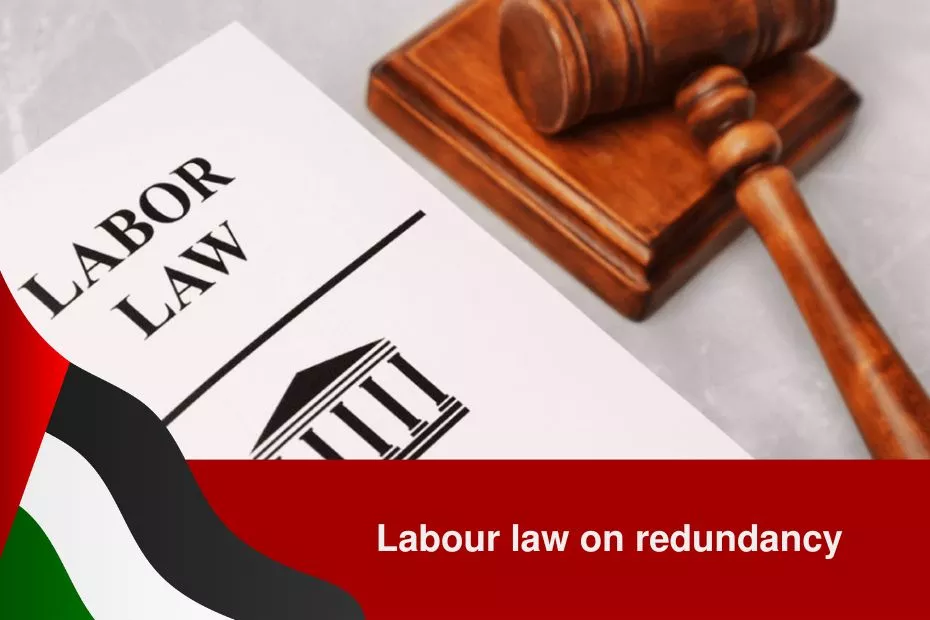In today’s competitive economic landscape, understanding labour law on redundancy in UAE is essential for both employers and employees seeking clarity and protection. Whether you’re an executive facing termination due to redundancy in UAE or an employer planning downsizing, navigating this legal terrain requires precision. Labour law on redundancy in UAE defines rights, obligations, and safeguards—making employment law redundancy consultation in UAE critical for a smooth and legally compliant process.
Act now to protect your rights or business, click on the WhatsApp icon below.
Table of Contents
Legal Framework: Labour law on redundancy
Understanding the numerical benchmarks of labour law on redundancy in UAE helps both employers and employees evaluate their obligations and entitlements quickly. From statutory notice periods to service-based gratuity payouts, here are the most critical figures that define lawful redundancy in the UAE.
- Legal Basis: Federal Decree-Law No. 33 of 2021 (as amended in 2023).
- Notice Period: Minimum 30 days unless contract specifies otherwise.
- Gratuity:
- 21 days’ wage/year for first 5 years
- 30 days’ wage/year thereafter
- Annual Leave Payment: All unused days paid in full based on basic wage.
- Redundancy Justification Required: Restructuring, insolvency, or technological redundancy.
- Dispute Time Limit: 1 year to file a labour claim from termination date.
Mandatory Payments in Redundancy Cases
Below is a table summarizing mandatory severance and related payments under the labour law on redundancy in UAE:
| Payment Type | Eligibility | Calculation | Legal Reference |
|---|---|---|---|
| Severance/gratuity pay | Employees with ≥1 year continuous service | 21 days’ wage per year first 5 years; 30 days thereafter | UAE Labour Law (Federal Decree‑Law No. 33 of 2021) |
| Notice pay | All employees (unless mutually waived) | Wages for duration of employment law redundancy notice period | UAE Labour Law, redundancy notice period provisions |
| Accrued annual leave | All employees at termination | Unused leave days × basic wage per day (basic + housing if fixed) | UAE Labour Law, Annual Leave provisions |
| End-of-service gratuity adjustment | If service includes previous laws | Payable per current law for entire service | UAE Labour Law transitional provisions |
Redundancy Process: Employer Compliance Checklist
Employers must ensure the following:
- Valid basis for redundancy: Economic downturn, restructuring, or technological obsolescence.
- Clear communication: Provide redundancy notice in writing within the statutory employment law redundancy notice period.
- Fair selection criteria: Apply objective criteria (e.g., performance, tenure) to avoid discrimination or wrongful termination claims.
- Timely and accurate payments: Ensure severance, notice pay, and accrued benefits are paid on final settlement.
- Document retention: Keep records of redundancy rationale, notices, calculations, and payments for potential audits or disputes.
- Employment law redundancy consultation in UAE: Engage legal counsel before implementing redundancy to ensure compliance with federal and free zone regulations.
Employee Rights: What to Do If Made Redundant
If you’ve been made redundant, you have specific rights under UAE law. Acting quickly can secure your entitlements and prevent legal loss.
- Request written confirmation of termination reason and redundancy notice period.
- Check your employment contract and confirm the required notice period and entitlement to gratuity.
- Calculate expected severance and ensure it aligns with labour law on redundancy in UAE statutory rates.
- If severance or notice pay is withheld, escalate via:
- MOHRE (Ministry of Human Resources & Emiratisation) – mainland UAE.
- Free zone authorities – e.g., DIFC Courts or ADGM Courts.
- Seek advice from labor lawyers in UAE to assess contract terms and negotiate adequate compensation or challenge unfair redundancy.
How Labour Lawyers Mitigate Redundancy Risks
Labor lawyers play a pivotal role in both preventive and reactive strategies to minimize legal exposure and protect interests. The table below explains:
| Stakeholder | Lawyer’s Role | Key Outcomes |
|---|---|---|
| Employers | Provide employment law redundancy consultation in UAE, draft fair selection processes, ensure compliance with notice and severance payment rules. | Minimized risk of unfair dismissal claims, maintained corporate reputation. |
| Employees | Assess termination due to redundancy in UAE, audit settlement calculations, file claims with MOHRE or free zone authorities. | Enhanced severance outcomes, protection of rights, reduced financial loss. |
| Both | Mediate disputes, facilitate mutually agreeable exit terms, including outplacement or settlement negotiations. | Smoother exit process, potential for amicable resolution, cost and time savings for both parties. |
FAQ
In navigating labour law on redundancy in UAE, clarity, fairness, and legal precision are paramount. Employers benefit from structured compliance and risk management, while employees gain protection through accurate entitlements and recourse avenues. Engaging experienced labour lawyers in UAE ensures both parties can manage termination due to redundancy in UAE with confidence and authority.
To proactively safeguard your interests, contact our employment lawyers in Dubai via the WhatsApp icon below.
Disclaimer: The information herein is for educational purposes only and does not constitute legal advice. For tailored guidance, please consult a licensed attorney in the United Arab Emirates.
Legal Sources:
- Federal Decree-Law No. (33) of 2021 on the Regulation of Labour Relations
- Ministerial Resolution No. (47) of 2022 Regarding the Guidelines for Termination of Employment
- Labour Law Regulations in DIFC and ADGM
A legal consultant and legal expert in the United Arab Emirates. He publishes selected articles on the website and writes in various categories of UAE law, with a particular focus on labor law.
